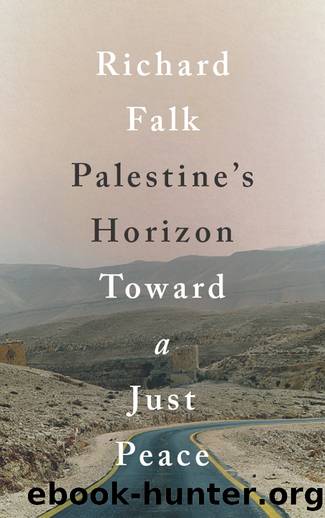Palestine's Horizon: Toward a Just Peace by Richard A. Falk

Author:Richard A. Falk [Falk, Richard A.]
Language: eng
Format: epub
Tags: Politics
ISBN: 9780745399744
Google: BuwxvgAACAAJ
Goodreads: 31573572
Publisher: Pluto Press
Published: 2017-01-15T11:56:35+00:00
8
Palestine Becomes a State
On November 29, 2012 the UN General Assembly voted 138:9 to upgrade the status of Palestine from being a âpermanent observer entityâ to that of ânon-member statehood.â The date had symbolic significance as it is the UN official âDay of Solidarity with the Palestinian People,â observed in many places around the world, underscoring the plight of millions of Palestinians living under occupation, often as refugees, and many others scattered in an involuntary Palestinian diaspora throughout the world, a set of dismal conditions endured by some of the Palestinian people since the nakba of 1948 and for the rest (other than the 1.5 million living as a discriminated against minority within Israel) since the Six-Day War of 1967.
The initial reaction among Palestinians was to declare victory, and to celebrate this symbolic recognition as a political step closer to the goal of self-determination, expressed by way of the establishment of a sovereign Palestinian state within secured and acknowledged borders associated with the 1967 âGreen Line,â and including having its capital in Jerusalem, either in joint administration with Israel or in that part of the city known as East Jerusalem, and occupied by Israel since 1967.
It should be realized that this move by the Palestinian Liberation Organization and the Palestinian Authority in the General Assembly was a sequel to the stalled effort in 2011 to achieve full-fledged UN membership. This initiative, eloquently presented to the world community by Mahmoud Abbas in his speech on November 29, 2012 to the General Assembly, was blocked, as had been anticipated by the United States, which threatened to cast a veto if necessary to ensure that the membership (which implied statehood) bid did not go forward. The preferred mode of the United States was to bottle up the issue indefinitely in the tangled procedures of the UN bureaucracy, which it succeeded in doing, raising serious questions about the ability of a single powerful state to control the operations of the Organization on matters such as membership, which should not depend on the presence of a geopolitical consensus among the permanent members of the Security Council. Such a threatened use of the veto power, while technically consistent with the UN constitutional framework, is highly irresponsible, and should signal other countries to circumscribe the use of the veto along with other reforms that would make the UN Security Council more responsive to the needs and values of the organized world community in the early twenty-first century.
Few on either side of the controversy over Palestinian statehood paused to evaluate its real effects on the long struggle to realize Palestinian rights. On the Palestinian side, many assumed that any measure that was so intensely opposed by Israel, and its junior partner, the United States, must be of benefit to the Palestinians. Hamas reinforced this understanding by abandoning its original opposition to the statehood bid to one of political support, part of a renewed politics of reconciliation as between Fatah and Hamas. Although a Hamas spokesperson clarified this show
Download
This site does not store any files on its server. We only index and link to content provided by other sites. Please contact the content providers to delete copyright contents if any and email us, we'll remove relevant links or contents immediately.
The Secret History by Donna Tartt(19086)
The Social Justice Warrior Handbook by Lisa De Pasquale(12190)
Thirteen Reasons Why by Jay Asher(8909)
This Is How You Lose Her by Junot Diaz(6886)
Weapons of Math Destruction by Cathy O'Neil(6279)
Zero to One by Peter Thiel(5801)
Beartown by Fredrik Backman(5754)
The Myth of the Strong Leader by Archie Brown(5507)
The Fire Next Time by James Baldwin(5442)
How Democracies Die by Steven Levitsky & Daniel Ziblatt(5218)
Promise Me, Dad by Joe Biden(5153)
Stone's Rules by Roger Stone(5087)
A Higher Loyalty: Truth, Lies, and Leadership by James Comey(4962)
100 Deadly Skills by Clint Emerson(4925)
Rise and Kill First by Ronen Bergman(4788)
Secrecy World by Jake Bernstein(4753)
The David Icke Guide to the Global Conspiracy (and how to end it) by David Icke(4717)
The Farm by Tom Rob Smith(4507)
The Doomsday Machine by Daniel Ellsberg(4490)
